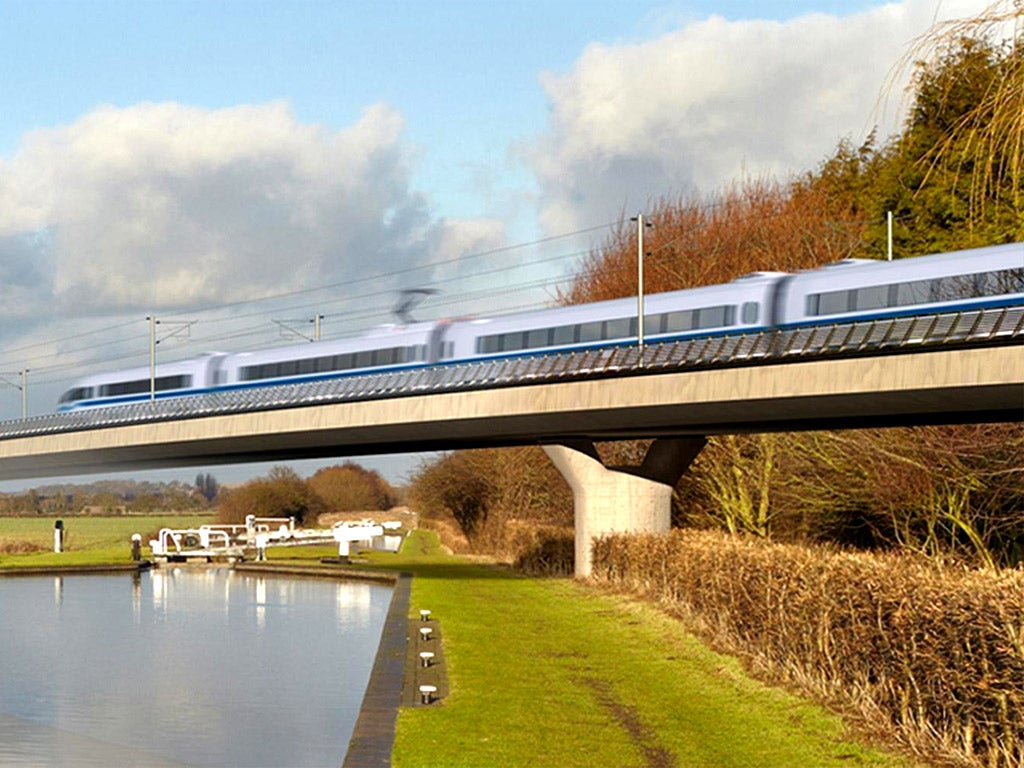Ministers hit the buffers as auditors question case for HS2 train link

Your support helps us to tell the story
From reproductive rights to climate change to Big Tech, The Independent is on the ground when the story is developing. Whether it's investigating the financials of Elon Musk's pro-Trump PAC or producing our latest documentary, 'The A Word', which shines a light on the American women fighting for reproductive rights, we know how important it is to parse out the facts from the messaging.
At such a critical moment in US history, we need reporters on the ground. Your donation allows us to keep sending journalists to speak to both sides of the story.
The Independent is trusted by Americans across the entire political spectrum. And unlike many other quality news outlets, we choose not to lock Americans out of our reporting and analysis with paywalls. We believe quality journalism should be available to everyone, paid for by those who can afford it.
Your support makes all the difference.Ministers have failed to make a clear “strategic case” for their ambitious plan to build a new high-speed railway between London and the North, the Government’s auditors claim.
In a damaging report, which will be seized upon by critics of £33 billion scheme, the National Audit Office warns that it is not clear to what extend HS2 would promote economic growth and provide value for money. It also questions whether the new line can be delivered on time and without cost over-runs.
But in a highly unusual move the Department of Transport has refused to sign off the on the report's conclusions - despite co-operating with its preparation.
Departmental sources accused the NAO of using out of date information, basing its findings on incomplete and misleading statistics and failing to take into account the wider benefits of the scheme.
“This report was prepared by accountants and it shows,” said one figure in the department.
“They are not project managers or indeed engineers. Of course there are risks with a project this size but if you used the NAO's logic the M25 would never have been built and neither would the Victoria line.”
In its report the NAO said it was not clear how HS2 - which runs through Tory heartlands and is bitterly opposed by some MPs - would deliver and rebalance economic growth
The timetable for planning phase one of the project - from London to Birmingham with work due to start in 2016/17 - was “ challenging”, the NAO said.
“(It) makes delivering this work difficult and increases the risk that the programme will have a weak foundation for securing and demonstrating success in the future”, the report added.
Expressing “reservations” about the business case for HS2, the NAO said the Department for Transport's (DfT) methodology for appraising the project put a high emphasis on journey-time savings, from faster and more reliable journeys.
But the report added that the relationship between these savings and the strategic reasons for doing the project, such as rebalancing regional economies, was unclear.
The report also suggested there was an estimated £3.3 billion funding gap which the Government has yet to decide how to fill. It added it this “gap in affordability” coincided with the “peak spending years for phase one”.
“The department capital forecast for these four years is £33.7 billion but its capital budget if kept constant at 2014-15 levels would be only £30.4 billion,” it said.
The NAO said the benefit-cost ratio - the cost of the project set against the likely benefits it will bring - had twice contained errors and that the current estimate of £1.4 in benefit to every £1.0 spent was “likely to change”.
It added that between March 2010 and February 2011 benefits from HS2 reduced by £12 billion, with nearly two-thirds of this reduction due to errors in the way passenger demand was modelled.
The NAO also said that HS2 Ltd had not yet analysed the effect of premium pricing on forecast passenger demand, revenues and the benefit-cost ratio.
The report went on: “To forecast passenger demand, HS2 Ltd uses the same average fares for high-speed and conventional rail in its models, although premium fares are charged for HS1 (the London to Folkestone Channel Tunnel link)”.
NAO head Amyas Morse said: “It's too early in the HS2 programme to conclude on the likelihood of its achieving value for money.
”Our concern at this point is the lack of clarity around the department's (DfT) objectives.“
But the Transport Secretary Patrick McLoughlin said he rejected the NAO's conclusion.
”It depends too much on out of date analysis and does not give due weight to the good progress that has been made since last year,“ he said.
”The case for HS2 is clear. Without it the key rail routes connecting London, the Midlands and the North will be overwhelmed.
“We are not building HS2 simply because the computer says ”Yes“ . We are building it because it is the right thing to do to make Britain a stronger and more prosperous place.”
However the chairman of the Public Accounts Committee chairman Margaret Hodge said there was virtually no evidence in the business case to support claims that HS2 would deliver regional economic growth - one of the key aims and justifications for this project.
“Unless the department gets its act together, HS2 will not deliver all intended benefits for travellers and the regions, and it will not deliver value for the taxpayer,” she said.
Video: George Osborne rejects HS2 report
Join our commenting forum
Join thought-provoking conversations, follow other Independent readers and see their replies
Comments